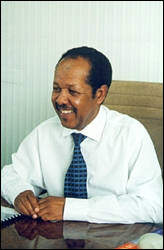 CHANGING BARREN MINES INTO FECUND MINES - MINES/ENERGY CHANGING BARREN MINES INTO FECUND MINES - MINES/ENERGY |
Ethiopia is well endowed with minerals such as gold, platinum, tantalum, ceramics, bentonite, diatomite, potash, Soda ash, marble, granite, limestone, geo-thermal, coal, natural gas and oil.
In spite of the vast mineral potential of the country, the sector still remains undeveloped by world standards, contributing to less than one percent of the total Gross Domestic Product of the country.
Although attempts to develop the mining industry in the country date back to the early years of this century, the progress has been erratic and limited. Main factors include the undeveloped state of the economy, lack of information on the mineral endowment of the country and the absence of know-how.
State mining production has become insensitive to mineral market conditions, high cost mines have failed to improve efficiency and have continued in production even when suffering losses.
The stagnation in mining is due not only to low investment, but also to management deficiencies, shortage of technical skills, an unsupportive policy environment, and political interference.
During the Dergue regime, the private sector was not allowed to participate in the exploration and development activities of high value mineral resources.
The issuance of the mining proclamation No. 52/1993 and the mining tax proclamation No. 53/1993 in 1993 has changed the prospect of the country's mining industry for the better. This can be observed from the considerable number of local and foreign mining companies who have either started work or are showing a strong interest to participate in the development of the country's mineral resources.

Mr. Izaddin Ali, Minister of Mines and Energy, confirms, "We have about 30 investors in the mining area. 19 of them are national investors and the rest 12 are foreign companies from USA, Canada, Norway, Saudi Arabia and South Africa. We are even expecting more companies to join our sector."
The present government has restricted itself in mapping, research and exploration works. Mr. Izaddin heralds, "In our new mining policy we promote the exploration areas and then leave the rest to the private investors. We have pulled out from operations.
Even our gold mine is now completely privatized. We are in the process of privatizing our small mines like tantalum, sodash, and other minerals as well. In the future the main activity of the government will only be directed to regulatory functions."
Mining operations are expected to have a high discounted cash flow rate of return and a short payback period. Being fully aware of the fact, the government has provided incentives, such as a depreciation scheme known as a straight-line method. By issuing this method, all capital expenditure and pre-production costs may be depreciated from any accounting year on a straight-line basis for four consecutive years.
Moreover, any financial loss, resulting from mining operations of a licensee in an accounting year may be carried forward and deducted from gross income in the ten accounting years which follow the year in which the loss incurred.
The reorientation of the economic policy and the subsequent issuance of a new investment law encourage private entrepreneurs to invest in the mining sector.
| Moreover, the government is encouraging domestic as well as foreign investors to get involved in the mining sector, which boasts a variety of huge untapped resources. In fact, the horizons of opportunities for investors to engage in prospecting, exploration and development of a wide-ranging spectrum of reserves of minerals have attracted the National Mining Corporation PLC to seize the opportunity to invest in this sector
Lack of infrastructural basis did not deter the determination of National Mining Corporation, which is the first private company, from exploration of different mining fields in remote areas.

Mr. Melaku Beza, General Manager of National Mining Corporation, says, "Of course, poor infrastructure has got an impact on our costs, specially on our export prices which makes it higher, and less competitive to the international market. We think that things are improving. Big roads have been constructed and upgraded. In the future, we think we will get relieved."
The corporation has started exporting gold, finished products of marble and granite as well as blocks to the Middle East, European, North American and other countries. Mr. Melaku states, "Our products penetrate into the market by themselves. We have got unique dimension stones that are sky blue marble, and unique white marble with pink and green tint.
We are exporting our pink tinted white marble to Bahrain, and we are exporting beige limestone to the United States, North Carolina. And our gold is exported to Switzerland."
National Mining Corporation, which is part of MIDROC Group, wants a partner in the oil sector. "We will be very much interested in attracting investors in the oil sector. In that sector we need expertise. We are not looking for finance, but we need the know-how " he says. It is also known that the National Mining Corporation is a member of the Marble Institute of USThe Corporation has diversified it activities from the dimension stones to include the exploration and development of gold, mineral water, oil shale, oil and gas as well as industrial minerals.
 The need to Maintain and Develop The need to Maintain and Develop
Ethiopia's electric energy potential is 60 billion kilowatts and only one percent of this potential has been utilized yet. Only four percent of the population have access to electricity. Per capita consumption is among the lowest even by the standard of less developed countries.
Run-down electric power plants gasp and die at peak power load (usually when the lights are turned on at dusk. Sometimes the lights come on again after a few minutes, while the wait could last for hours quite often.
A fractured bearing somewhere in a hydroelectric installation may mean no electricity for weeks or months. Continuous stealing of electric poles and wires contributes to the continuous disruption of power in different towns.
In order to overcome these pitfalls and shortage of power, the only state owned power supplier Ethiopian Electric Power Corporation is going to undertake 1.2 billion dollar maintenance and extension project.
|

